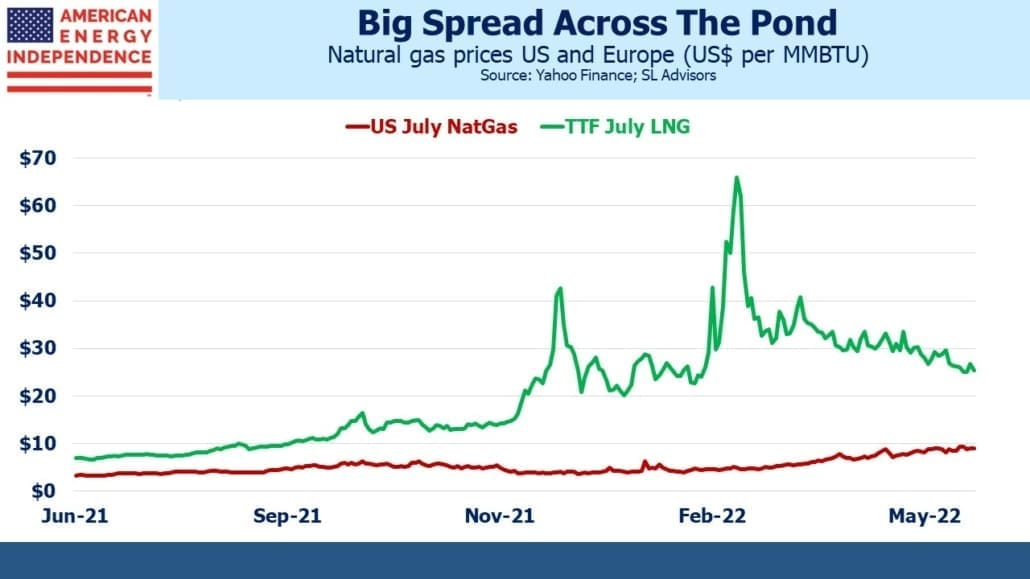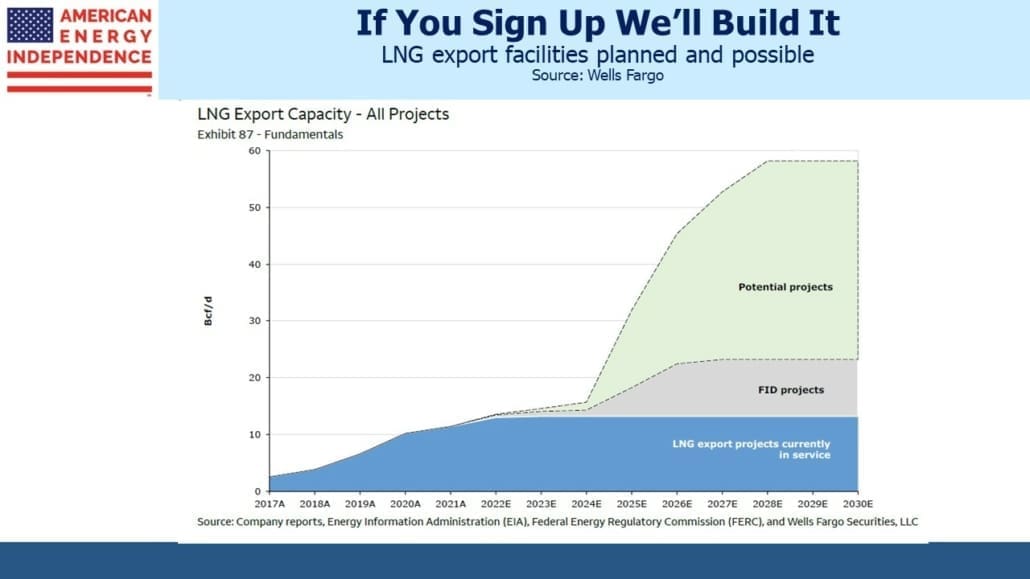Energy Realism Is Spreading

/
There were three stories last week that can best be characterized as providing energy realism. The fire at Freeport’s LNG facility sent US natural gas prices skidding, with the loss of 2 Billion Cubic Feet per Day (BCF/D) of export capacity. Freeport warned it’ll be at least three weeks before operations can resume – meaning 2BCF/D of additional natural gas in the US domestic market. Dutch TTF gas futures similarly rallied on fears of reduced supply. But both markets later reversed their initial move.
Nonetheless, the spread between the two is far wider than the cost of transporting LNG across the Atlantic. The US is currently able to export around 12 BCF/D. LNG export facilities take several years to build, so there’s no near term prospect that cheap US natural gas will solve Europe’s energy security problem.
Over the next couple of years capacity will increase slightly, but within five years we should have the ability to deliver a further 10 BCF/D based on projects that have reached Final Investment Decision (FID).
Negotiations with potential buyers over the next couple of years will determine how far we go beyond that 22-24 BCF/D. If all the potential projects get funded, by the end of the decade exports could be almost 5X what they are now. Much depends on the willingness of buyers to make long term commitments. Cheniere has contracts of 20 years or more with highly rated buyers.
There’s no alternative use for a liquefaction facility, so customers have to be lined up before construction begins. US natural gas prices have been largely insulated from higher global prices because of export limitations. This will gradually change in the years to come, narrowing the gap to the benefit of US natural gas producers.
A second story worth reading concerns OPEC’s limited spare capacity. Crude oil continues to drift relentlessly higher. US motorists may complain about high prices at the pump, but they are low compared to most other countries. The current $5 per gallon would need to be $8.50 to compare with much of western Europe.
At some point demand destruction will become more apparent – but so far US states have been temporarily suspending gasoline taxes (ie New York) while the White House has resorted to ineffectually releasing oil from the Strategic Petroleum Reserve and seeking help from Saudi Arabia. Meanwhile demand continues to set new records, with global consumption expected to exceed 100 million barrels per day next year.
This is another example of the shallow support for efforts to combat climate change. Decarbonizing our energy means higher prices – obviously, or we’d already have done it. But Democrats fear a public backlash over higher prices even when they can plausibly shift at least some of the blame to Russia.
Deliberately engineering higher prices, via a carbon tax for example, is how we’d accelerate the energy transition. But there’s no support for that, so policy relies on vilifying the producers of reliable energy while claiming that solar and wind are ready to electrify everything with cheap energy and lots of union jobs.
This is why Democrats have improbably been so great for energy investors. They’re dissuading investments in new production and infrastructure, causing higher prices.
The huge weakness with solar and wind is their low, intermittent output. Solar panels and onshore windmills typically generate power around 20-25% of the time. Offshore wind is 30-40%. Combined cycle natural gas plants run at 90-95%. The result is that increased use of intermittent energy requires greater overall capacity.
Large scale battery storage adds substantial cost. A dozen large battery projects have been postponed or canceled recently, due to rising costs and difficulty in obtaining raw materials. Competition from electric vehicle manufacturers isn’t helping.
The purist view that solar and wind will solve every problem risks energy shortages in places like California. Coal to gas switching and increased use of nuclear power are the two best paths to lower CO2 emissions. US natural gas stands poised to help other countries emulate the reduced emissions we have achieved over the past decade.
In other news, I had the great pleasure of joining Josh Brown and Michael Batnick on Episode 50 of their show The Compound And Friends. We had a wide-ranging and fun discussion of markets. The episode is appropriately titled The Energy Bull Market Just Started. Josh and Mike are great hosts whose genuine interest in this guest’s opinions made being on their show utterly self-indulgent.
We have three funds that seek to profit from this environment:
Please see important Legal Disclosures.

Important Disclosures
The information provided is for informational purposes only and investors should determine for themselves whether a particular service, security or product is suitable for their investment needs. The information contained herein is not complete, may not be current, is subject to change, and is subject to, and qualified in its entirety by, the more complete disclosures, risk factors and other terms that are contained in the disclosure, prospectus, and offering. Certain information herein has been obtained from third party sources and, although believed to be reliable, has not been independently verified and its accuracy or completeness cannot be guaranteed. No representation is made with respect to the accuracy, completeness or timeliness of this information. Nothing provided on this site constitutes tax advice. Individuals should seek the advice of their own tax advisor for specific information regarding tax consequences of investments. Investments in securities entail risk and are not suitable for all investors. This site is not a recommendation nor an offer to sell (or solicitation of an offer to buy) securities in the United States or in any other jurisdiction.
References to indexes and benchmarks are hypothetical illustrations of aggregate returns and do not reflect the performance of any actual investment. Investors cannot invest in an index and do not reflect the deduction of the advisor’s fees or other trading expenses. There can be no assurance that current investments will be profitable. Actual realized returns will depend on, among other factors, the value of assets and market conditions at the time of disposition, any related transaction costs, and the timing of the purchase. Indexes and benchmarks may not directly correlate or only partially relate to portfolios managed by SL Advisors as they have different underlying investments and may use different strategies or have different objectives than portfolios managed by SL Advisors (e.g. The Alerian index is a group MLP securities in the oil and gas industries. Portfolios may not include the same investments that are included in the Alerian Index. The S & P Index does not directly relate to investment strategies managed by SL Advisers.)
This site may contain forward-looking statements relating to the objectives, opportunities, and the future performance of the U.S. market generally. Forward-looking statements may be identified by the use of such words as; “believe,” “expect,” “anticipate,” “should,” “planned,” “estimated,” “potential” and other similar terms. Examples of forward-looking statements include, but are not limited to, estimates with respect to financial condition, results of operations, and success or lack of success of any particular investment strategy. All are subject to various factors, including, but not limited to general and local economic conditions, changing levels of competition within certain industries and markets, changes in interest rates, changes in legislation or regulation, and other economic, competitive, governmental, regulatory and technological factors affecting a portfolio’s operations that could cause actual results to differ materially from projected results. Such statements are forward-looking in nature and involves a number of known and unknown risks, uncertainties and other factors, and accordingly, actual results may differ materially from those reflected or contemplated in such forward-looking statements. Prospective investors are cautioned not to place undue reliance on any forward-looking statements or examples. None of SL Advisors LLC or any of its affiliates or principals nor any other individual or entity assumes any obligation to update any forward-looking statements as a result of new information, subsequent events or any other circumstances. All statements made herein speak only as of the date that they were made. r
Certain hyperlinks or referenced websites on the Site, if any, are for your convenience and forward you to third parties’ websites, which generally are recognized by their top level domain name. Any descriptions of, references to, or links to other products, publications or services does not constitute an endorsement, authorization, sponsorship by or affiliation with SL Advisors LLC with respect to any linked site or its sponsor, unless expressly stated by SL Advisors LLC. Any such information, products or sites have not necessarily been reviewed by SL Advisors LLC and are provided or maintained by third parties over whom SL Advisors LLC exercise no control. SL Advisors LLC expressly disclaim any responsibility for the content, the accuracy of the information, and/or quality of products or services provided by or advertised on these third-party sites.
All investment strategies have the potential for profit or loss. Different types of investments involve varying degrees of risk, and there can be no assurance that any specific investment will be suitable or profitable for a client’s investment portfolio.
Past performance of the American Energy Independence Index is not indicative of future returns.





Leave a Reply
Want to join the discussion?Feel free to contribute!